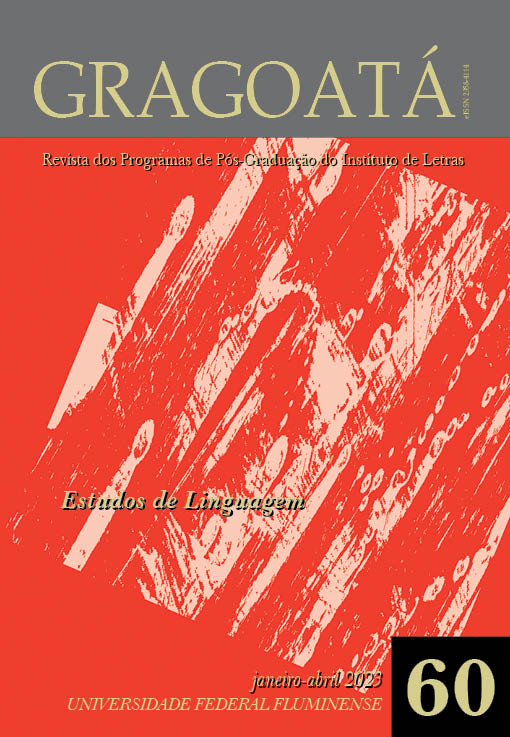Barreiras ou pontos de inspeção? Ideologias linguísticas sobre migração e o modelo de comunicação moderno-colonial
DOI:
https://doi.org/10.22409/gragoata.v28i60.53275Palavras-chave:
Imigração, Comunicação, Barreira linguística, Ideologias linguísticasResumo
Neste artigo, apresentamos uma perspectiva crítica sobre regimes metadiscursivos da “barreira linguística” em contextos de mobilidade, discutindo a persistência dos pressupostos de transparência e homogeneidade herdados da razão moderno-colonial sobre nossos modelos de língua e comunicação, em confronto com práticas linguísticas heterogêneas em nossa experiência etnográfica com estudantes migrantes numa universidade pública brasileira. O artigo está dividido em três seções. Inicialmente, discutimos os usos da expressão “barreira linguística” no debate acadêmico sobre línguas e migração, evidenciando sua posição metadiscursiva para justificar ou racionalizar “desentendimentos” ou “problemas de comunicação”. Em seguida, apresentamos como a noção de barreira é articulada enquanto elemento estruturante da comunicação no debate público sobre imigração no Brasil, em notícias e documentos governamentais. Em seguida, analisamos formas metapragmáticas que emergem em interações entre estudantes migrantes participantes da nossa experiência etnográfica, quando elas avaliam e enquadram situações que poderiam ser identificadas como “barreira linguística” nos termos pressupostos pelos debates. Os resultados indicam que formas metapragmáticas que poderiam ser identificadas como “barreira linguística” configuram-se muito mais como “pontos de inspeção linguística”, funcionando como “paradas” interacionais de “checagem”, em que elas e/ou as/os interlocutora/es fazem uso de algum tipo de desencontro do contato linguístico para realizar ações no mundo. Concluímos que as formas interacionais resistem na fronteira da violência do modelo de comunicação moderno, desafiando seus pressupostos, ao mesmo tempo em que são tensionadas pela noção de “barreira linguística” enquanto figuração da governança das línguas e das pessoas em deslocamento ao redor do globo.
Downloads
Downloads
Publicado
Edição
Seção
Licença
Copyright (c) 2023 Gragoatá

Este trabalho está licenciado sob uma licença Creative Commons Attribution 4.0 International License.
AUTORIZAÇÃO
Autores que publicam em Gragoatá concordam com os seguintes termos:
Os autores mantêm os direitos e cedem à revista o direito à primeira publicação, simultaneamente submetido a uma licença Creative Commons Atribuição 4.0 Internacional (CC BY 4.0), que permite o compartilhamento por terceiros com a devida menção ao autor e à primeira publicação pela Gragoatá.
Os autores podem entrar em acordos contratuais adicionais e separados para a distribuição não exclusiva da versão publicada da obra (por exemplo, postá-la em um repositório institucional ou publicá-la em um livro), com o reconhecimento de sua publicação inicial na Gragoatá.
A Gragoatá utiliza uma Licença Creative Commons - Atribuição CC BY 4.0 Internacional.











